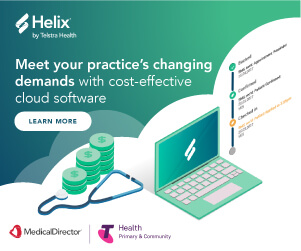Why 2019 is all about cloud health software
In 2018, we saw how cloud computing is playing an increasingly critical role in transforming healthcare’s digital ecosystem, and in 2019, the benefits of cloud health software are set to become more evident than ever before.
A recent report, Healthcare Cloud Computing: Global Markets to 2022, predicts the global market for healthcare cloud computing to grow at a compound annual growth rate of 11.6% from 2017 through 2022, to reach $35.0 billion by 2022. This exponential growth is linked to cloud-based solutions allowing faster access from anywhere, and any device, while offering better diagnostic quality and instant online access to patient images and reports.
And as healthcare providers look to maximise efficiency and meet the demands of value-based care, the cloud will continue to be embraced exponentially. With the benefits of improved security and interoperability, cloud enables considerable opportunities for cross-platform integration, as well as leveraging deeper data and insights to enable more efficient and accurate delivery of care.
Better health communication
A key benefit of cloud health software is that it supports better real-time communication. For instance, it supports digital referrals, faster communication between primary healthcare providers and hospitals, as well as better communication between GPs and allied health providers. Ultimately, it is this real-time benefit of cloud software that helps support interoperability in the wider health ecosystem.
Cloud-based solutions support collaboration in healthcare, allowing multiple stakeholders to share information securely and seamlessly across the network. MedicalDirector’s recent whitepaper, Interoperability in healthcare: Synergising an industry, found a significant benefit of moving towards cloud-based solutions is that it support more interoperable systems, which in turn benefits coordinated care and improved patient outcomes.
Anywhere, anytime access
One of the benefits of cloud software is accessing patient information instantly anywhere and on any device. This means while at home, or on the go seeing patients, you could access test results, write clinical notes, update patient information, all in real-time, without having to wait and go back into the office.
In fact, MedicalDirector’s report further revealed cloud-based health solutions provides the digital infrastructure needed to effectively coordinate more flexible patient-centric care. When it comes to the cloud, 64% of respondents admitted they consider flexibility to be the main benefit of using a cloud-based HER/PMS systems. enhancing the workflow capabilities of care teams and improving the patient experience.
Moving away from legacy, on-premises solutions and into the cloud will enable hospitals and health systems to improve workflow and efficiency, which will in turn enable healthcare providers to focus more closely on providing value-based care, improve the patient experience and achieve better clinical and hospital outcomes.
Security and compliance
With tougher cyber security laws now in full force, the pressure is on the healthcare industry to take security and compliance seriously.
Cloud-based applications like Helix, which is built on the robust market leading Microsoft Azure platform, are becoming far more secure and sophisticated than on-premises legacy solutions. This is because cloud service providers must ensure data is encrypted, backed up, easily recoverable and secured with strict role-based access. It is also prudent to note that while cloud solution providers implement their security measures, healthcare organisations must ensure they have the right security architecture in place to keep sensitive data safe.
Deeper data insights for better informed decisions
A cloud-based healthcare ecosystem offers more effective integration and storage of volumes of patient data and information, while helping to orchestrate fragmented information across multiple systems and sites of care. In fact, according to a Kaufman Hall report, healthcare consolidation hit an all-time high in 2017, with 115 deals totalling $63.2 billion.
Cloud computing can process vast amounts of structured and unstructured data, which healthcare providers and stakeholders can leverage to gain deeper, more meaningful insights. This in turn can help drive better, more accurate and informed decisions and improve patient engagement and outcomes.
Seamless appointment management
Cloud-based clinical and practice software systems like Helix offer fast, streamlined and highly efficient ways of accessing and managing your appointment book. This is made possible by:
- An enhanced user interface
- Single or multiple clinician view options
- Daily/weekly/monthly filters
- Automatic OPV checks
- Easy to update patient details
- Drag and drop feature to change appointment times
In particular, users of Helix enjoy a faster and more accurate patient search by providing the ability to search a patient by first name, surname, Medicare number, patient ID with additional predictive text functionality.
The Appointment Book in Helix also includes integration with online booking engine partners such as MyHealthFirst, HotDoc and AutoMed, and SMS capabilities from partners such as MessageBird for appointment reminders and replies, which further improves practice time management and strengthen communication with patients.
Fast access to patient records
Users of cloud-based software can enjoy fast, efficient access to patient records, which are easy to navigate during busy times. For instance with Helix, the layout and information is organised and formatted to fit exactly how you actually think as a clinician, helping support more efficient clinical decision-making and improving the overall clinical experience for you and your patients by increasing the visibility and access of patient information.
Helix enables users to make filter patient records easily from a drop-down list, making accessing patient history much more efficient. This ‘Patient Timeline’ includes functionality such as;
- View previous consults and associated actions
- View pathology and imaging results received electronically
- View scanned documents
- View recalls
- View My Health Record Shared Health Summary log
- Reprint pathology requests, imaging request and letters
Pain-free Medicare bulk billing
Users of innovative cloud-based software are already enjoying the benefits of faster, more accurate seamless patient processing. Award winning software like Helix already performs automatic Online Patient Verification (OPV) checks. This means users will no longer have to remember to perform a manual check prior to billing and if there were any failures, Helix will prevent the user from being able to issue the invoice until the problem is rectified or another billing method is chosen. This helps remove Medicare rejections that may result from invalid Medicare details and in turn reduce the workload of any practices that may face this common issue today.
Streamlining common daily tasks
From prescriptions to referral letters, pathology requests and managing test results, smart cloud health software users are enjoying efficiencies in every aspect of the patient journey.
For instance, Helix offers automatic alerts that are generated for drug-allergies, drug-intolerances, drug-drug interactions, drug-gender, drug-pregnancy and drug-elite sports person. The Helix prescribing module is also enhanced by an integration of selected AusDI medicines information content, including PIs, CMIs and Independent Drug Monographs. AusDI is a leading medicines information resource brought to you by the MedicalDirector team and delivers one of the most comprehensive drug databases in Australia.
Helix also offers a streamlined process for generating pathology and imaging requests for patients, plus offers a number of easy to use templates for streamlining common workflow tasks like writing letters. And to enhance clinical outcomes and patient understanding, Helix provides users with a ‘Patient Education functionality tool. Integrated with partner Healthshare to provide access to over 1,200 up-to-date fact sheets from health organisations, users can simply print the relevant factsheet for their patient so the patient has more relevant information about their health and how to manage it.









